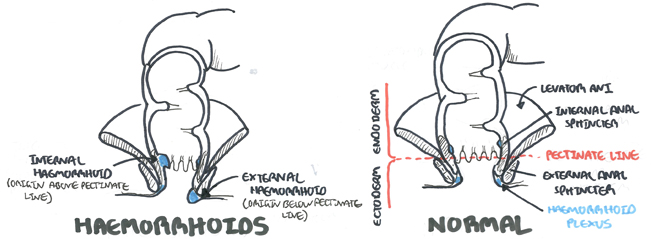
Hemorrhoids are painful lumps on the anus that can be either internal or external. Half of the population will suffer from hemorrhoids by age 50, and many women will develop them during pregnancy. They are often caused by straining during bowel movements or by long-term constipation. Treatments for hemorrhoids include increasing fiber intake and drinking more fluids. Surgical procedures may also be necessary.
There is currently no effective treatment for hemorrhoids, and only 10% of patients require surgery. While surgical management is effective in relieving symptoms, it can lead to greater pain and disability and has several risks. The procedure has a high rate of complication, which makes it an expensive and invasive option. Although it is an effective treatment, it is not recommended for all patients. It is not recommended for severe hemorrhoids, and requires extensive recovery.
Treatments for hemorrhoids vary, and they can range from lifestyle changes to radical surgery. While surgery is often an effective treatment, it should be reserved for patients with advanced symptoms. It also carries appreciable risks. Nonoperative and topical treatments have been less effective, but still have some benefit. The hope is that newer techniques will improve the condition and ultimately, reduce the risk of further complications. With improved treatment options, more people will benefit from these treatments.
Various lifestyle changes may help prevent hemorrhoids. For example, increasing fiber intake and reducing fat intake are both helpful, but some patients may require surgical treatment. For people with more severe cases, sclerotherapy may be a viable option. This method reduces pain, but can cause incontinence or anal stricture. It is important to know that there is no one treatment for hemorrhoids.
In the United Kingdom, hemorrhoids affect about 12% to 36% of the general population. The actual number may be higher, but it’s hard to say. Because these are part of the anatomy, it can be difficult to identify them. However, if you’re worried that you might develop hemorrhoids, there are several ways to deal with them. There are topical creams for itchiness and sclerotherapy.
In the most severe cases, patients may have to undergo surgery to alleviate the pain. While there are many treatments for hemorrhoids, the best treatment depends on the severity of the symptoms. Changing your diet and toilet habits can help you manage the pain and recurrence. While the most effective treatment for hemorrhoids is to reduce the risk of the condition, you should consult a physician. If you’re experiencing severe pain, you should change your diet.
In addition to treating hemorrhoids, you should avoid bowel discomfort. If you have hemorrhoids, you should avoid drinking excessive amounts of water and consuming foods with high fiber content. A doctor can diagnose hemorrhoids by examining the swollen veins and their surrounding tissues. If you suspect that you have this condition, you should consult a doctor as soon as possible. In some cases, bleeding hemorrhoids are a sign of cancer.
The cause of hemorrhoids can be quite simple. The disorder causes inflammation of the anorectum and causes discomfort in the anus. The pain can be caused by the irritated tissue surrounding the anus. It can be treated with medications that treat inflammation and the symptoms associated with it. Surgical treatment for hemorrhoids is an option when nonsurgical methods fail to relieve symptoms. In some cases, it may be necessary to undergo surgery.
The symptoms of hemorrhoids can vary depending on the cause. The most common symptom is discomfort during bowel movements. Most people suffering from hemorrhoids should visit a doctor as soon as the problem becomes painful. Fortunately, there are treatments for hemorrhoids that can help ease the pain and prevent complications. During the painful phase of the condition, changes in diet and toilet habits are recommended for relief and prevention.
Treatment for hemorrhoids varies from one individual to another. Surgical treatments include excisional haemorrhoidectomy, which involves cutting off the blood supply to the affected tissue. While the symptoms of hemorrhoids are usually temporary, some individuals may experience chronic coughing, pelvic floor dysfunction, and connective tissue disorders. Some people may also be predisposed to hemorrhoids based on their lifestyle.
